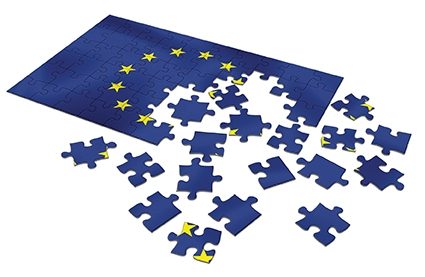The Complex Mosaic of the Multiple EU Crises - Where Does Georgia Fit in?
Lately, the European Union has experienced a number of severe crises, starting with the financial one of 2008-2009, from which it has yet to fully recover. This was followed by sad developments in Greece, war in Syria and the migration crisis, deteriorating relations with Russia over the hybrid war in eastern Ukraine and the annexation of Crimea, a wave of terrorist attacks, the Brexit referendum in Great Britain, and the resurgence of right and left wing populism all over Europe, along with some other lesser issues. While Georgia is not an EU member, and not immediately involved in any of these crises, due to its close relations with the EU, and because of the changing economic and security environment in its neighborhood, it is directly and indirectly influenced by what is taking place in Europe.
Europe’s current hurdles are existential, putting at risk not just European unity and future; due to the sheer size of its economy and its soft power, the repercussions will go far beyond the continent, hitting neighboring countries striving to join the European club, like Georgia. The present situation looks really quite worrisome, as many essential internal weaknesses have overlapped through negative synergy, triggered by the above-mentioned external factors – the lack of political consolidation and a complicated decision-making system, rather ineffective form of economic integration, and last by no mean's least the scarcity of strong, popular, and visionary European leaders. Several waves of EU expansion also have caused this gradual erosion of unity and efficacy of governance and decision-making, as more than two dozen member states pursue too frequently radically different positions, representing a broad ideological spectrum of ruling elites.
Generally speaking, the more internal problems Europe experiences, the fewer resources, commitment, and unity are available to assist neighbors such as Georgia. And it is not just slowing economies of EU member states, or multiplying needs to spend more in order to deal with existing problems such as accommodating migrants, that make available resources scarce; what is more important is the increasingly diverging visions among European leaders about policy priorities and directions that hurt the EU and its neighbors most.
One of the key issues for the EU is paradoxically enough related to its soft power, quality of life, and attractiveness, making it the favorite destination for global migration. While immigration may be highly beneficial for the receiving states, populations throughout Europe see this differently, especially against a background of sluggish economy, unemployment, and the wave of terrorist attacks. This has pushed many European states toward restricting immigration, putting the 'Willkommenskultur' at the mercy of a few altruistic policymakers and charities. Obviously, such an increasingly negative attitude towards migration does not facilitate the smooth way of Georgia's visa liberalization process, or the country's prospects for further European integration.
However, there are issues that are more important for Georgia than visa liberalization. Located in a rather complex geopolitical environment dominated by Georgia’s northern neighbor - Russia, it is national security that should be seen by the Georgian government as absolute priority. In that light, EU-Russia relations should be followed closely as having a strong impact on assertiveness and the nature of Russia’s policies in its neighborhood, and on the willingness of Brussels to support Georgia’s pro-western aspirations. Georgia should conduct careful, balanced policies consistent with Euro-Atlantic integration as the main strategic target for its actions, while minimizing risks emanating from its northern neighbor through smart diplomacy mixed with strengthening defense cooperation with the West.
Georgian politicians should also well realize that any serious mistakes that they may commit, such as human rights breaches, selective justice, discrimination of minorities, electoral violations, and political violence, will provide strong arguments to the opponents of EU’s commitment toward supporting Georgia and its government, whether with regard to visa liberalization, economic assistance or political support. The government and political parties should avoid cheap populist rhetoric, especially based on false promises, and mobilized aggression towards any political group or social community.
Georgia, which has successfully started the difficult transition from the 'grey zone' of regime hybridity to a liberal, democratic state, needs to be very careful not to fall into the trap of populist demagoguery and instead should ensure that its democratic and Europeanization projects are solidly rooted in the minds and attitudes of Georgian citizens. But this is not enough, as a long term communication strategy is necessary to popularize Georgia and its democratic credentials throughout Europe, employing such instruments as media, exhibitions, various public events, cultural and people exchanges, along with smart diplomacy and pro-active initiatives. Georgia should show that is not solely on the receiving side of international assistance, but is also ready to provide help in situations of need or emergency, as already happening through strong military participation in hotspots such as Afghanistan. Finally, everything should be done to encourage Georgian society to maximize benefits from the DCFTA and the Association Agreement by attracting export-oriented, productive European investment instead of focusing on short-term gains through foreign investment into non-productive real estate.
Only by becoming a reliable, consistent, democratic, and dedicated partner of the EU, can Georgia turn risks caused by European crises into benefits of closer relation and mutual trust.
Teona Lavrelashvili












